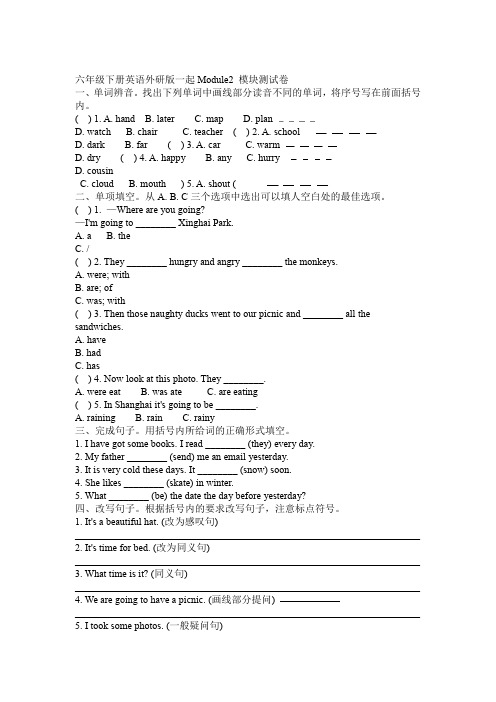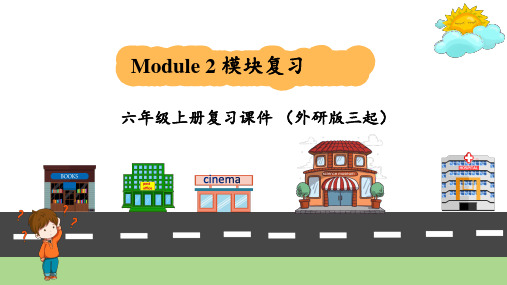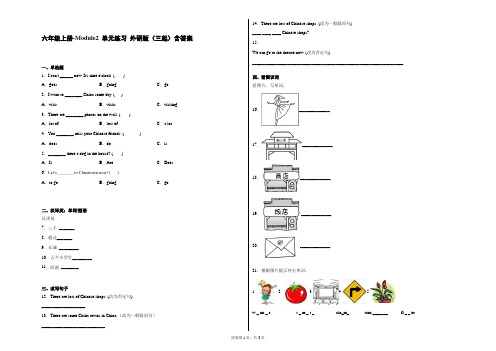六年级Module 2复习单
外研版(三起)英语六年级上册Module 2单元测试卷含答案

1.Where is the Dongting Lake?
__________________________________
2. Is the Huanghe River famous?
_________________________________
3.Is Tian'anmen Square in Shanghai?
七、将下列句子排列成一段通顺的对话.(6分)
() Can you tell me more about Shanghai?
()What are you doing,Daming?
() It's in the east of China.
()I'm reading a book about Shanghai.
答案:
听力部分
一、1.B2.A3.A4.C5.B
二、2 4 5 1 3
三、1.B2.C3.C4.C5.A
四、1.F2.T3.T4.F5.T
笔试部分
五、1.dancing2.shop3.sometimes4. strong5.Then
六、1. to go 2. are 3. any 4. dancing 5. pupils 6. take
2. Let's go to the clothes___________(商店).
3.Mr Wang__________(有时) sings English songs for us.
4. The Great Wall is old but__________.(坚固的)
5.---We can't go now. It's raining. --- __________(既然是这样,那么)let’s go tomorrow.
六年级上册Module 2知识梳理

六年级上册Module 2知识梳理一、词汇dancing 跳舞,舞蹈(名词)Chinatown 唐人街,中国城(名词)shop 商店(名词)sometimes 有时(副词)strong 坚固的(形容词)then 那么,既然是这样(副词)than 比them 他们thin 瘦的二、短语in New Y ork 在纽约in China 在中国too late 太晚go shopping 去购物miss China 想念中国all towns 所有的城镇all towns in China 中国所有的城镇a famous mountain 一个著名的山three noodle shops 三家面条店the Huangshan Mountain 黄山the Changjiang River 长江many people 许多人in the street 在大街上三、词形转换town (复数形式)towns China (形容词)Chinesetaxi (复数形式)taxis bus (复数形式)busesdance (现在分词)dancing that’s (完全形式)that islong (反义词)short late (反义词)early四、解析1. Are there any Chinatowns in China? 中国有一些唐人街吗?some 和any表示“一些”,some常用于肯定句中,any常用于否定句和疑问句中。
2.I’m sending an email to my family in China.我正在给我在中国的家人发电子邮件。
send (现在分词)sending an email 一封电子邮件send an email 发送一封电子邮件send an email to sb 给某人发送一封电子邮件3. Do you want to go to Chinatown? 你想去唐人街吗?go to Chinatown 去唐人街want to go to Chinatown 想去唐人街want to do sth. 想要做某事4. Do you miss your family? 你想念你的家人吗?(一般疑问句)miss your family 想念你的家人you (形容词性物主代词)your5. Can you tell me more about Chinatown? (一般疑问句)你能告诉我更多关于唐人街的情况吗?I(宾格)me6. There are lots of Chinese shops and restaurants there.那里有许多中国商店和饭馆。
外研版小学英语六年级下册 Module 2 复习训练

He is going to visit him. Cindy is going to learn to dance during the winter vacation. Lucy and Lily are twins. They are going to Beijing with their parents. There are many places of interest(名胜古迹) in Beijing, such as the Summer Palace and the Palace Museum. Everyone has a good plan.
( D )1. It's sixty dollars. C. When are you going to eat? D. How much is it?
( B )2. I'm going to play E. What's the weather like in
basketball.
Shanghai?
dry
past
look like
2. We're going to play ping-pong at half ___p_a_s_t __ three.
3. It will be__w_i_n_d_y__ tomorrow. Let's fly kites in the park.
windy pond
B. stay _b_e_a_u_ti_f_u_l B. past ___t_en____
二、读句子,选择恰当的词填空。
windy pond
dry
past
look like
1. Look at that duck. It's swimming on the _p_o_n_d__.
六年级上学期英语Module2复习资料

Module2Where would you like to go on holiday?单词:Unit4旗国家的国旗首都意大利的意大利罗马巴黎极好美国华盛顿哥伦比亚区纽约东京悉尼堪培拉渥太华惠灵顿Unit5可能吵闹的拥挤的安静的山仅仅;正;恰好长城俄罗斯莫斯科柏林人口百万词组:Module Two 国旗最大的城市去度假其他城市世界上长城好主意!返回一个游览的好地方相当吵闹参观长城更愿意我想做某事重要句子:Unit41、What national flag is it?It’s .这是什么国旗?这是中国国旗。
2、?The capital of Australia isCanberra.澳大利亚的首都是什么?澳大利亚的首都是堪培拉。
Unit53、Where would you like (go/to go) on holiday? 你想去哪里度假?I would like to go to Rome. 我想去罗马。
I go toTokyo. Tokyo is我更愿意去东京。
东京是个游览的好地方4、Where shall we go? .我们将要去哪里呢?我想去罗马。
5、Why don’t we Beijing?That’s a good idea.我们为什么不回北京呢?那是个好主意。
重要表格:语法:形容词、副词比较级和最高级1)形容词修饰名词,说明事物或人的性质或特征;副词是一种用来修饰动词,形容词,副词或全句的词,说明时间,地点,程度,方式等概念。
英语中大多数形容词、副词是可以分等级的,一般有三个等级:原级,比较级和最高级。
形容词、副词的本来形式就是形容词的原级。
如:John is a tall boy.两者间进行比较用形容词比较级。
如:Jim is taller than John.三者或者三者以上进行比较用形容词的最高级。
Mike is the tallest of the three boys.(形容词最高级前面要加定冠词the)2).形容词、副词比较级和最高级有规则变化和不规则变化(1)规则形容词副词级的构成形容词的比较级形式是在形容词末加-er或其前面加more;最高级形式是在词末加-est 或在其前面加most。
英语人教版六年级下册Unit 2 Last Weekend复习课

PEP小学英语六年级下册Unit2复习课教学设计肥城市安驾装镇张安小学王静本单元是PEP版六年级下册的第二单元,这个单元的话题是Last weekend,此单元可以设计为6课时,本节课主要是学习过去式的时间词以及was用法。
一、教学内容复习掌握一些表示过去式的时间词以及was用法,并能运用过去式举行会话练习。
二、教学目标知识目标1、能借助数字推理理解yesterday、last weekend/month/…day 等的意思以及be动词was的变化。
2、能辨别过去式句型并能正确表达。
3、能借助图片,用比较流利的语言进行交流。
4、能借助书面提示,完成填空,使句子完整。
情感、文化意识目标1、中西方日期表达方法的差异。
2、合作的意识。
三、教学重难点1)重点:听说读写短语 watched TV、washed the clothes、cleaned the room、played football、visited grandparents;能听说句子 what did you do last weekend?并能就过去时间所做的事情进行简单回答。
2)难点:学生对本课的几个短语都比较熟悉,但动词的过去式第一次出现,因此,这几个短语的过去式的构成及其发音是本课的难点。
四、学习策略1、温习2、比赛3、练4、认真倾听并作出判断五、课前准备课件、听力材料、学生图片等六、教学过程Step one:listen to a song(设计思路:课前让学生唱,欣赏英语歌曲,创设良好的英语学习氛围,激发了学生的学习热情。
)Step Two: Presentation1、Review the words(利用小组间竞赛的形式进行抢答拼出单词,能有效提高学生的积极性,活跃课堂氛围)Ss first read the words together.Second, Ss in groups have a match of reciting words. The winner can get a point. Then the group can get a star on the Bb.2、To review the phrases of past tense.Teacher can show the phrases on the screen, Ss read and act out the phrases.Then, Ss can play a game about guessing the phrases in past tense.3、To review the main sentences(借助日常生活自己所做过的事来应用到课堂对话中,即练习了过去时句型又能拓展知识面) T: Do you know what kind of sentences we learned in this unit?Ss: How was your weekend?Ss: What did you do last weekend?Ss: Did you ………..Teacher show the sentences on the Bb,Ss can do a survey about their last weekend.Ss can also practise sentences in groups one by one like a train.4、 Free talk(自由对话以本单元重点句型为主,适当加入以前知识)Ss can make a conversation using the main sentences in groups.The groups who can act well with no wrong uses can get a point.5、 Make a interview.(此活动可以锻炼学生的口语交际能力和交际能力)Ss can act to be reporters to interview classmates asking about the things they have done last weekend or yesterday. Step threeDo some exercises on the screen.Ss can answer like a train,one by one in groups.Step fourCheck the answers.Teachers can pick out the difficult parts to Ss and explain much more.Step fiveHomework:1、Make a call to interview your friend:What did you do last weekend?2、Write a report: My Last Weekend.。
六年级下册第二模块课前预习重点及课后自测练习题

六 年 级 各 模 块 之 重 点Module 2 Unit 1课前预习重点词汇一、必须听写的单词(请先在横线上写好中文意思,不确定的可以先用铅笔写,听完课以后再用钢笔填写):1. around duck soon dry naughty2. time only eleven twelve first thenrain beautiful there naughty duck3. 短语:have a picnic 去野餐 in the park 在公园 at half past twelve 在12点半walk around the lake 绕湖散步 go under that tree 去那棵树下面二、必须理解的句子(请在横线上写出句子的中文意思,不确定的都请先用铅笔写。
):1. When are we going to eat?We ’re going to eat at half past twelve.2. We are going to have a picnic3. What ’s time is it?. It ’s half past twelve. It ’s nine o ’clock.4. What are they going to do ?They ’re going to eat our sandwiches.5.It ’s going to rain soon.三、必须会的(请在横线上写出中文意思,不确定的可用铅笔写):4:00pm 3:30pm 9:00am 12:30amModule 2 Unit 2课前预习重点词汇一、必须听写的单词(请先在横线上写好中文意思,不确定的可以先用铅笔写,听完课以后再用钢笔填写):1.tomorrow today weather snow sunny windy hot a lot二、必须理解的句子(请在横线上写出句子的中文意思,不确定的都请先用铅笔写。
六年级教材同步6AM1-M2单元复习与测试6AModule1-Module2复习

C 7.
[单选题] [特殊疑问句] [难度: ★★ ]
--What ______ your old school like? It was old and small.
A. does
B. was
C. did
【参考答案】
B
【思维对话】 1.思维障碍:1)学生会选择 A 或者 C。学生遇到的思维障碍是把 like 当做动 词喜欢的意思,找助动词 does 2)学生没有看完句子注意句子的语法时态用 法。 2.突破方法:1)让学生读一遍题目分析选择 A 或者 C 选项的理由。这是老师可 以根据学生的回答及时捕获学生的思维障碍。2)如果学生回答说 like 意思是 喜欢,应该用助动词 does。3)老师问:你看下句子的回答是什么时态呢?学 生回答:过去时 4)老师问:你翻译下句子的意思 5)学生回答:这里 like 如 果是喜欢的意思不对,应该是怎么样。6)老师回答:是的,这里的 like 是作 介词怎么样,像的意思然后老师再问 What’s the weather like?让学生回答 句子的意思 7)学生回答天气怎么样 8)老师归纳 like 的用法,除了喜欢还可 以做介词怎么样,像的意思 6)老师让学生对比句子分析然后进行总结。学生 总结:like 可以做介词还可以做动词喜欢,如果做介词 be like 表示怎么样。 3.变式巩固训练:
2.
[介词短语;动词短语;固定搭配;其他短语] [难度: ★★ ]
翻译下列短语
在农场_______________________ 在农村_______________________
挤牛奶______________________ 放学后______________________
六年级下册英语 Module 2模块测试卷 外研社一起含答案

六年级下册英语外研版一起Module2 模块测试卷一、单词辨音。
找出下列单词中画线部分读音不同的单词,将序号写在前面括号内。
( ) 1. A. hand B. later C. map D. planD. watch B. chair C. teacher ( ) 2. A. schoolD. dark B. far ( ) 3. A. car C. warmD. dry ( ) 4. A. happy B. any C. hurryD. cousinC. cloud B. mouth ) 5. A. shout (二、单项填空。
从A. B. C三个选项中选出可以填人空白处的最佳选项。
( ) 1. —Where are you going?—I'm going to ________ Xinghai Park.A. aB. theC. /( ) 2. They ________ hungry and angry ________ the monkeys.A. were; withB. are; ofC. was; with( ) 3. Then those naughty ducks went to our picnic and ________ all the sandwiches.A. haveB. hadC. has( ) 4. Now look at this photo. They ________.A. were eatB. was ateC. are eating( ) 5. In Shanghai it's going to be ________.A. rainingB. rainC. rainy三、完成句子。
用括号内所给词的正确形式填空。
1. I have got some books. I read ________ (they) every day.2. My father ________ (send) me an email yesterday.3. It is very cold these days. It ________ (snow) soon.4. She likes ________ (skate) in winter.5. What ________ (be) the date the day before yesterday?四、改写句子。
Module 2(复习课件)-六年级英语上册(外研版三起)

六年级上册复习课件 (外研版三起)
science museum
Contents
1 知识网络 2 知识梳理 3 精讲精练 4 巩固提升
Part 1
知识网络
Unit 1
dancing, Chinatown, sometimes, shop, then, strong 词汇
据句意及汉语提示写出单词。 1. I ___s_o_m_e_t_im__e_s__ (有时) go to school by bike. 2. There are many____sh__o_p_s____ (商店) near my home. 3. The Great Wall is very ___s_t_r_o_n_g____ (坚固的). 4. —There isn't any food to eat.
连词成句。 4. postcard, like, hope, you, this, I(. ) __I__h_o_p_e_y_o_u__li_k_e_t_h_i_s_p_o_s_t_c_a_rd__s._________ 5. go, let' s, to, now, restaurant, the(. )
12. 骑自行车上班____r_id_i_n_g__b_ic_y_c_l_es__to__w_o_r_k_______ 13. 西湖__________th_e__W__e_st_L__a_k_e________________ 14. 黄山_______th__e_H__u_a_n_g_s_h_a_n_M__o_u_n_t_a_i_n_________ 15面馆________n_o_o_d_l_e_s_h_o_p_____________________ 16. 在...的中心____i_n_t_h_e_m__i_d_d_le__o_f_______________
2020年深圳英语六年级下冲刺复习Module 2

六年级下冲刺复习Module 2第一部分看中文,写英文_____________艺术家;画家_____________画笔;刷子;刷_____________绘画颜料_____________不高兴的_____________油_____________仔细地_____________墨水;墨汁_____________强有力的_____________一直;始终_____________在左边_____________在右边_____________素描_____________油画_____________剪刀_____________胶带_____________胶水_____________工具_____________容易地_____________仍然_____________手艺;工艺_____________锯_____________ 工匠;手艺人_____________工匠;手艺人(复数)_____________王冠;皇冠_____________房子模型_____________很久以前_____________忙着_____________自言自语_____________跳远_____________跳高_____________长跑_____________短跑_____________ 获胜;赢得_____________健壮的_____________准备活动;热身练习_____________ 游泳池_____________游泳镜_____________游泳帽_____________(尤其指女士的)游泳衣二、选择填空. 从每小题的三个选项中选出最佳选项。
1. Kitty likes music. She can _______.A. play the violinB. play violinC. plays the violin2.The teacher put ______egg on the table and asked the children todraw it.A. aB. anC. the3. People ______ can go to museums. That’s fantastic!A. in the countrysideB. in the cityC. in space4. “__________ are you?” I’m 150 centimetres tall .”A. How muchB. How oldC. How tall5. Joe and Alice are making a model house _______Kitty.A. toB. forC. give6. Paul likes ______with toy planes.A. playingB. playC. plays7. We use ______to cut paper.A. glueB. scissorsC. tape8. We can use ______to cut things easily because it has sharp teeth.A. A sawB. an axC. stone9. You should wear _______, otherwise(否则)the water would get into your eyes.A. a swimsuitB. a swimming capC. swimming goggles10. I want to draw a picture. Can you ______ me a pencil, please?A. giveB. givingC. gives三、完形填空。
外研版(三起点)小学英语六年级上册Module 2单元练习

外研版(三起点)小学英语六年级上册Module 2单元练习一、单词拼写(词汇运用)1.按要求写单词(1)long(反义词)(2)beautiful (同义词)(3)strong(反义词)(4)China(形容词)(5)it's(完全形式)(6)late(反义词)(7)these((对应词)(8)is(复数)(9)his(主格)(10)this(复数)二、单选题2.My mother and I dancing.A.am B.is C.are3.I'm to my family .A.writeing B.write C.writing 4.There are lots of famous in China.A.mountains B.mountain C.a mountain 5.Let's .A.go to a school B.go to school C.go to the school 6.Look this river.A.at B.on C.of 7.Please tell about the story of Beijing.A.he B.me C.I8.It's late now.A.two B.too C.to9.These my postcards.A.are B.to C.by10.The river is more than six metres long.A.high B.thousands C.thousand 11.There is a monkey the tree.A.at B.on C.in三、根据所给问句,选择合适的答句12.—What are you doing?—A.I can dance.B.I'm dancing. 13.—Do you miss your family?—A.Sometimes.B.Thank you.14.—Do you go to Chinatown?—A.No, I do.B.Yes, I do.15.—Can you tell me about Chinatown?—A.Yes, I can .B.No, she can't.四、选词填空(词汇运用)16.根据句意选词填空。
六年级上册-Module2 单元练习 外研版(三起)含答案

A.When he was five.B.On his birthday.C.Today.
42.Who gave the postcard to the writer? ()
A.His mother.B.His father.C.His pen friend.
16. ______________
17. ______________
18. ______________
19. ______________
20. ______________
21.根据图片提示补全单词。
1. 2. 3. 4. 5.
w _ nn _ r t _ m _ t _ cin_m_ turn _______ fl _ _ er
3.There are ________ photos on the wall. ( )
A.lot ofB.lots ofC.a lot
4.You ________ miss your Chinese friends. ( )
A.doesB.doC.is
5.________ there a dog in the house? ( )
14.Are there many
15.We can’t go to the theatre now.
16.dancing
17.Chinatown
18.shop
19.restaurant
20.email
21.1.winner; 2.tomato; 3.cinema; 4.turn right; 5.flowers; 6.beside; 7.dance; 8.hungry; 9.read; 10.strong
六下二单元知识点及作业单

第二单元学习知识点(参考)一、听写(新课教完第二天进行反馈)二、同音字(同一个字可进行扩词练习)Jiāng:缰绳僵硬新疆边疆僵持僵局泥浆将军zhēng:争取挣扎峥嵘狰狞睁开风筝铮铮悦耳征服怔忪正月蒸发xún:初旬询问怪石嶙峋荀子循环寻找巡视中华鲟jiǎo:佼佼者饺子狡猾绞尽脑汁皎洁侥幸搅拌缴费矫正bàn:陪伴搅拌绊倒绊手绊脚半途而废打扮花瓣办理xiāo:元宵消失销毁削皮硝烟逍遥冲上云霄潇洒嚣张萧瑟shā:沙子纱布砂石liáo:獠牙嘹亮燎原撩动官僚jiàn:蜜饯实践贱卖溅起水花推荐鉴定三、多音字:(自己查字典,将生字读音写下来)铺和更间分传哄模扎载四、形近字辨析矩()()栗()()熬()()拒()()粟()()遨()()即()()誉()()醋()()既()()誊()()酷()()腊()()掺()()糯()()蜡()()惨()()儒()()五、课文重难点6.《北京的春节》:【主题提炼:文本内容——写作意图——蕴含的情感】老舍用充满京味的朴实无华的语言,描绘了(),表现了(),表达了()。
【以时间为顺序有详有略的表达方法】好处是:以时间为经线,以人们的活动为纬线的结构,使得文章衔接自然,结构完整。
描写春节习俗时重点描写了“腊八”“除夕”“正月初一”和“元宵”四天的情景,突出重点,主次分明,有利于读者对北京人过春节的风俗习惯有全面的了解和深刻的认识。
【拓展】:(1)老舍的语言风格。
可以结合以前学过的课文《猫》、《草原》等作品举例说明。
(2)各地的春节习俗。
通过网络或者查阅书籍进行搜集整理。
【可附纸质打印稿,但要有概括性的主题提要】(3)习作小练笔:写一写家乡的春节。
(400字左右)【时间顺序、详略得当、突出节日的特点】7.《藏戏》:结合课前导读提示了解藏戏的特点、传奇故事和艺术特色,领悟文章的表达方法。
【反问句开篇法】整体感知、先声夺人的表达效果和引出下文的作用。
人教PEP版六年级英语下册期末复习 Unit 2单元知识梳理卷

Unit 2单元知识梳理卷基础知识梳理一、单词过关。
(12分)1. 飞机__________2. early __________3. 出租汽车________4. sled__________5. (大)船__________6. fast__________7. 地铁__________ 8. ferry__________9. 火车__________ 10. Scotland__________11. 停下__________ 12. wear__________二、重点短语。
(10分)1. 步行_______________2. 乘公共汽车________________3. 慢下来________________4. pay attention to________________5. traffic lights ________________三、重点句子。
(10分)1. 你怎么来学校的?____________________________________________________________ ______2. 通常我走路来。
____________________________________________________________ ______3. 在美国骑自行车的人必须戴(头盔)。
____________________________________________________________ ______4. 别闯红灯!____________________________________________________________ ______5. 我必须注意交通信号灯!____________________________________________________________ ______四、核心语言点。
(8分)本单元我们学习了表达使用何种交通工具以及一些交通标志的含义。
2019-2020年外研版小学英语六年级下册Module 2复习巩固

2019-2020年外研版小学英语六年级下册Module 2复习巩固第1题【单选题】It"s __________ to rain soon. ( )A、goB、goesC、going【答案】:【解析】:第2题【单选题】— What are you going to do today?— _____________. ( )A、What"s this?B、I"m going to go to the park to play.C、What are you doing?【答案】:【解析】:第3题【单选题】It will________ in Beijing.A、snowB、snowingC、be snow【答案】:【解析】:第4题【单选题】— Do Chinese like playing basketball?— ______.A、Yes, he doesB、No, they aren"tC、Yes, they do【答案】:【解析】:第5题【单选题】Let"s________ breakfast. It"s seven o"clock now.A、hasB、haveC、having【答案】:【解析】:第6题【单选题】— What time is it?— ______________. ( )A、It"s twelve.B、It"s an orange.C、It"s a book.【答案】:【解析】:第7题【单选题】We"re going to ____ a picnic in the park.( )A、haveB、hasC、having【答案】:【解析】:第8题【单选题】I miss everyone _____ China. ( )A、onB、atC、in【答案】:【解析】:第9题【单选题】We will go to play football_____ ten. ( )A、atB、inC、on【答案】:【解析】:第10题【单选题】— When are we going to eat?— __________ 12: 00. ( )A、AtB、InC、On【答案】:【解析】:第11题【单选题】It will _____ cold in Harbin. ( )A、doB、beC、is【答案】:【解析】:第12题【填空题】warm(反义词)______【答案】:【解析】:第13题【填空题】We ate hot dogs and______(喝可乐). 【答案】:【解析】:第14题【填空题】Oh dear!It"s______ now!【答案】:【解析】:第15题【填空题】根据图片提示补全短语。
小学英语六年级上册第二单元学习复习计划练习题.docx

小学英语六年级上册练习题Unit 2重要知点Class : ______Name:_________Mark :________一、翻。
1、16、南2、局17、3、医院18、西4、影院19、excuse me5、店20、far6、科学博物21、supermarket7、在哪里22、bank8、23、after school9、与⋯⋯相24、want10、弯25、a pair of11、右26、shoe store12、左27、get off13、成直地28、minute14、然后29、party15、北30、look for一,找出不同的。
()1. A. east B. west D. north()2. A. museum B. post office C. music D. library()3. A. plane B. cinema D. bus()4. right home left straight() light light light light四、从 A、 B、 C三个中最合适的一。
()1.Where are you from, Amy ? _________.A. I ’m Amy.B. I’m ten.C. I’m from America.()2.Stop at the ______.A. yellow lightB. green lightC. red light()3.The Science Museum is near the school ________the right.(A. onB. atC. in) 4. Is there a cinema near your home?________A. Yes, there isn’t.B. Yes, there is.C. No, thereis.( ( ( ( () 5. What does this sign mean? (这标志是什么意思?A. Turn right!B. Don't turn right!C. Turn left!) 6. If you want to buy some books, you can go to the ______. A. bookstore B. shoe shop C. post office) 7. If you want to see a doctor, you can go to the ______.A. hospitalB. libraryC. cinema) 8. Turn right ________ the school, then go ________.A. of, straightB. at, straightC. in, straight) 9. How do you go to school? I often go to school_____ foot. A. by B. on C. in)() 10. Excuse me, where is the library? It’s ________ the cine ma.A. nextB. next toC. At五、根据对话判断对错。
HN版英语六年级下册-Module 2 模块知识梳理卷(2021年-2022年)

5. 绘画颜料 ____________
6. 艺术家;(尤指)画家____________
7. 不高兴的_____________
8. 仔细地_______________________
9. 手艺;工艺___________
10. 王冠;皇冠__________________
11. 剪刀________________
13. 游泳帽___________________
14. 游泳池___________________
15. 准备活动;热身练习_______
16. 游泳镜___________________
17. 忙着(做事情) _____________
18. an art museum _____________
12. 胶带________________________
13. 胶水________________
14. 锯__________________________
15. 工具________________
16. 容易地______________________
17. 他自己______________
2
2021 年
15. —What are you making? —I'm making a toy plane for my brother. ______________________________________________________________
16. I want to make a crown. ______________________________________________________________
- 1、下载文档前请自行甄别文档内容的完整性,平台不提供额外的编辑、内容补充、找答案等附加服务。
- 2、"仅部分预览"的文档,不可在线预览部分如存在完整性等问题,可反馈申请退款(可完整预览的文档不适用该条件!)。
- 3、如文档侵犯您的权益,请联系客服反馈,我们会尽快为您处理(人工客服工作时间:9:00-18:30)。
Module 2一、单词1、气象(weather ['weðə])名词:sun [sʌn]太阳rain[ rein ]雨cloud/'klaud/云snow[ snəu ]雪wind[wɪnd]风动词:snow[ snəu ]下雪rain[ rein ]下雨形容词: cold /kəuld/冷的hot /hɔt/热的warm /wɔ:m/ 温暖的cool /ku:l/凉爽的snowy /snəui/下雪的sunny /'sʌni/晴朗的rainy /'reini/ 下雨的windy /'windi/ 刮风的cloudy /'klaudi/ 多云的weather report/'weðəri'pɔ:t/天气预报2、星期(week)Monday/'mʌndei/星期一Tuesday/'tju:zdi/ 星期二Wednesday/wenzdi/星期三Thursday/'θə:zdi/星期四Friday /'fraidi/星期五Saturday/'sætədi/星期六Sunday/'sʌndi/星期天weekend/'wi:k'end/周末3、介词in在……里面on 在……上面under/'ʌndə/在……下面near/niə/在……附近behind/bi'haind/在……后面next to 在……旁边in front /frʌnt/ of 在……前面4、代词第一人称:I /ai/ 我my/mai/我的we/wi:/我们our/'auə/我们的第二人称:you /ju:/ 你,你们your/juə/你的,你们的第三人称:he/hi:/他she/ʃi:/她it/it/它his/hiz/他的her/hə:/她的its/its/它的they/ðei/他们their[ðeə]他们的5、动物(animals)cat /kæt/猫dog /dɔg/ 狗pig /pig/猪duck /dʌk/鸭rabbit /'ræbit/兔子horse /hɔ:s/马elephant /'elifənt/ 大象fish /fiʃ/ 鱼bird /bə:d/ 鸟snake /sneik/蛇monkey /'mʌŋki/ 猴子panda /'pændə/ 熊猫bear /bɛə/熊lion /'laiən/ 狮tiger /'taigə/老虎fox/fɔks/狐狸sheep /ʃi:p/绵羊6、动词play/plei/玩swim/swim/游泳skate/skeit/溜冰fly/flai/飞jump/dʒʌmp/跳walk/wɔ:k/走run/rʌn/跑climb/klaim/爬eat/i:t/吃sleep/sli:p/睡觉like/laik/喜欢have/hæv/有buy/bai/买take/teik /拍(照),带live/liv/居住teach/ti:tʃ/教go/gəu/去study/'stʌdi/学习learn/lə:n/学习sing/siŋ/唱歌dance/dɑ:ns/跳舞row/rəu/划read books读书do homework做作业watch TV /wɔtʃ/ 看电视clean the bedroom /kli:n'bedrum/打扫房间wash the clothes/wɔʃkləuðz/洗衣服use a computer /kəm'pju:tə/用电脑do morning exercises /'mɔ:niŋ'eksəsaiz/做早操eat breakfast /i:t'brekfəst/吃早餐eat dinner /'dinə /吃晚饭go to school去上学have English class上英语课get up起床go shopping去购物climb mountains/klaim'mauntins/爬山read a book 读书play the piano /pi'ænəu/ 弹钢琴clean the room打扫房间visit grandparents /'vizit 'grænd,pɛərənt/拜访祖父母go hiking /haik/ 去远足fly kites /flai kaits/ 放风筝make a snowman /meikə'snəu,mæn/堆雪人plant trees /plɑ:nt tri:z/ 植树draw pictures /drɔ: 'piktʃəz/画画cook dinner /kuk'dinə/烧晚饭listen to music /'lisn 'mju:zik/听音乐write a letter /rait'letə/ 写信write an e-mail写电子邮件drink water /driŋk'wɔ:tə/ 喝水take pictures/teik'piktʃə/ 拍照片play chess /tʃes/ 下棋have a picnic /'piknik/ 野餐ride a bike /raid baik/ 骑自行车play the violin /,vaiə'lin/ 拉小提琴collect stamps /kə'lekt stæmp/ 集邮 meet/mi:t/ 遇见elcome/'welkəm/ 欢迎thank /θæŋk/ 谢谢work /wə:k/ 工作drink /driŋk/ 喝look /luk/ 看help /help/ 帮助pass/pɑ:s/ 传递show/ʃəu/展示,给……看use /ju:z/ 用clean /kli:n/ 打扫open/'əupən/ 打开close /kləuz/ 关put /put/ 放read /ri:d/ 读,看write /rait/ 写paint /peint/ 画画tell /tel/ 告诉ride /raid/ 骑stop /stɔp/ 停wait /weit/ 等find /faind/ 找drive /draiv/ 驾驶send /send/送,寄wash /wɔʃ/ 洗shine/ʃain/照耀become/bi'kʌm/变成feel /fi:l/ 感觉think /θiŋk/ 想fall /fɔ:l/ 掉下leave /li:v/ 离开put on穿上take off 脱下go to bed去睡觉hang up /hæŋʌp/ 挂起来wear /wɛə/ 穿go home回家play computer games/kəm'pju:tə geims/玩电脑游戏play chess /tʃes/ 下棋do housework /'hauswə:k/ 做家务get off下车 take a trip/trip/去郊游go to the cinema /'sinimə/去电影院7、疑问词(1)what什么what colour什么颜色what time几点what day星期几(2)how怎样how old年龄多大、几岁how many多少how much 多少钱how tall多高how heavy多重how long多长how big多大(3)who/hu:/谁whose/hu:z/谁的(4)when/h wen/什么时候(5) where/h wɛə/在哪里(6)why/hwai/为什么(7)which /h witʃ/ 哪一个二、短语to go剩余have breakfast吃早饭have lunch吃午饭look like看起来好像have a picnic野餐at half past twelve在十二点半on the pond在池塘里in the sky在空中 a beautiful day一个晴朗的日子go to the park去公园go to school去上学at home在家on Friday在星期五dark clouds乌云over there那儿naughty ducks淘气的鸭子三、句型When are we going to eat? 我们什么时候吃?At half past twelve.十二点半What time is it now? 现在什么时间?It’s only half past eleven. 现在才11点半。
I’m going to get up and have breakfast. 我将起床和吃早饭。
You are going to have lunch! 你将吃午饭吗?It’s going to rain soon. 天不久将要下雨。
It looks like you’re going to stay hungry.看起来你们将一直饿肚子了。
It’s raining now! 现在天在下雨!They’re eating our sandwiches! 他们正在吃我们的三明治!Let’s have a picnic in the park today! 今天让我们去公园野餐!It will snow in Harbin. 哈尔滨将下雪。
It will be sunny in Harbin. 哈尔滨将是晴朗的天气。
四、用法1、时间表达(1)直接表达法A. 用基数词+ o'clock来表示整点。
如:eight o'clock(2)间接表达法A. 如果分钟数少于30分钟,可用“分钟+ past + 钟点”其中past意思是“过”。
如:twenty past four 四点二十B. 如果分钟数多于30分钟,可用(60分钟—原分钟数)+ to +(原钟点数+ 1)表示,其中to意思是“差”。
如:8:35 可表示为twenty-five to nine 差二十五分钟九点,即八点三十五(其中的分钟数twenty-five 是由60分钟减去35分钟得到的;钟点数nine是由8加上1得到的)。
C. 当分钟数是15分钟时,可用名词quarter (一刻钟)表示。
如:7:15可表示为 a quarter past seven,D. 当分钟数是30分钟时,可用名词half (一半)表示。
